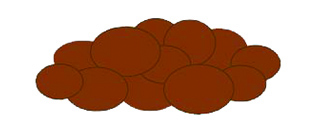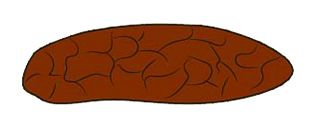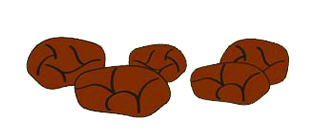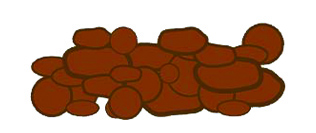
What is my poop telling me?
“We are what we eat.” You’ve likely heard the saying before, but the eating of food isn’t the end of the road.
What can we learn when the food we eat has passed through us? Shape, consistency and color of your stool can be telling in regards to what is going on inside of your body.
Take a look at the descriptions below and be sure to consult qualified clinician if you have any concerns.
What do shape and consistency mean
Type 1 - Separate, hard lumps, like nuts (hard to pass)

Type 2 - Sausage-shaped, but lumpy
Stool with the consistency of types 1 and 2 are signs of constipation. Including more water and fiber in your diet could be ways to relieve this situation. Fruits and veggies can be a great source of these nutrients!
If constipation persists, don't hesitate to contact a medical professional.

Type 3 - Like a sausage, but with cracks on its surface
Poop like type 3 is considered to be normal. Although type 2 and type 3 may look similar, the experience of passing a type 3 would be different than a type 2 — in that a type 3 should be soft and shouldn't take longer than one minute to be released.

Type 4 - Like a sausage or snake, smooth and soft
These critters are what some might think of as ideal, but it is possible that not every bowel movement comes out like this. Hopefully this would occur at least every one to three days.

Type 5 - Soft blobs with clear cut edges (easy to pass)
Although easy to pass, type 5 “potty times” may have you racing for a pit stop. Seeing this in the commode could be a sign of mild diarrhea. As with many things in our bodies, our bowel movements can vary and type 5 bowel movements can come and go occasionally.

Type 6 - Fluffy pieces with ragged edges, mushy
If type 6 comes three or more times per day, you likely have diarrhea. Diarrhea can lead to dehydration and depleted electrolytes. Be sure to hydrate and consult a doctor if this predicament persists.

Type 7 - Watery, no solid pieces (entirely liquid)
Type 7 is also likely diarrhea. If this occur three or more times per day for two day, consult a medical professional, especially in the event of fever or pain in your stomach or buttox.

This sign could be a symptom of a bigger issue. Like type 6, having a type 7 also risks dehydration and electrolyte loss.
SUBSCRIBE TO OUR BLOG
and you'll receive more health & wellness tips right in your inbox.
SUBSCRIBE NOWWhat does the color mean?
Brown
With only one way out of your body, your poop should be a mixing of the colors of everything that you ate. That scramble will likely wind up brown. Any shade of brown is typically an ideal color.
Green
Green is typically an OK color to see in the toilet. It can happen, but shouldn't occur too regularly.
It could mean that you ate lots of green veggies, which is alright. On the other hand, it could mean that you ate lots of green food coloring, which may not be so good.
Also, it may be a sign that your food isn't being digested quickly enough in relation to how fast it is passing through.
If your stool continues to be this color, seek medical attention.
Red
This may happen but should not occur regularly. Like green stool, red stool may be because of food coloring, but it could also be caused by bleeding in your large intestine or a scratch or hemorrhoid in your rectum.
If your stool continues to be this color, seek medical attention.
Black
Black poop could be caused by iron supplements or even bleeding in your in the early parts of your digestive system.
If this is the case it is a good idea to check in with your doctor.
Lighter Color
Aside from infants, yellow stools could be a sign that could mean that there is too much fat in your stool. It could also mean that your body is having trouble absorbing nutrients properly.
All in all, things with your poop can change. It’s not always going to be the same, but if you have questions or concerns you can always consult a medical professional.
Still Have Questions About Your Gut Health?
Schedule an appointment with one of our gastroenterologists.
Related Articles


